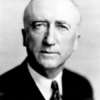James F. Byrnes

James F. Byrnes
James Francis Byrneswas an American politician from the state of South Carolina. During his career, Byrnes served as a U.S. Representative, a U.S. Senator, a Justice of the Supreme Court, Secretary of State, and 104th governor of South Carolina. He is one of very few politicians to serve in all three branches of the American federal government while also being active in state government. He was a confidant of U.S. President Franklin D. Roosevelt, and was one of the most...
NationalityAmerican
ProfessionPolitician
Date of Birth2 May 1879
CountryUnited States of America
That was the principle of reparations to which President Truman agreed at Potsdam. And the United States will not agree to the taking from Germany of greater reparations than was provided by the Potsdam Agreement.
The world so clamors for action that men and women devote little time to thinking. Many believe in secondhand thinking. They find it easier to ascertain and adopt the thoughts of others than to think for themselves.
Freedom from militarism will give the German people the opportunity, if they will but seize it, to apply their great energies and abilities to the works of peace.
German militarism and Nazism have devastated twice in our generation the lands of German neighbors.
We have learned that peace and well-being are indivisible and that our peace and well-being cannot be purchased at the price of peace or the well-being of any other country.
Important as economic unification is for the recovery of Germany and of Europe, the German people must recognize that the basic cause of their suffering and distress is the war which the Nazi dictatorship brought upon the world.
It is not in the interest of the German people or in the interest of world peace that Germany should become a pawn or a partner in a military struggle for power between the East and the West.
The nearest approach to immortality on earth is a government bureau.
The German people were not denied, however, the possibility of improving their lot by hard work over the years. Industrial growth and progress were not denied them.
The conditions which now exist in Germany make it impossible for industrial production to reach the levels which the occupying powers agreed were essential for a minimum German peacetime economy.
The carrying out of the Potsdam Agreement has, however, been obstructed by the failure of the Allied Control Council to take the necessary steps to enable the German economy to function as an economic unit.
Provision was also made for the distribution of Germany's foreign assets among the Allies.
Most of the victims of Nazi aggression were before the war less well off than Germany. They should not be expected by Germany to bear, unaided, the major costs of Nazi aggression.
The American people want peace. They have long since ceased to talk of a hard or a soft peace for Germany.